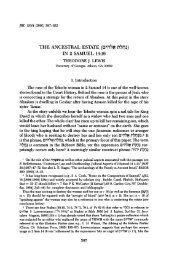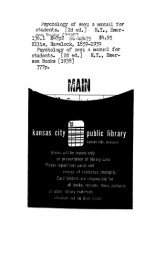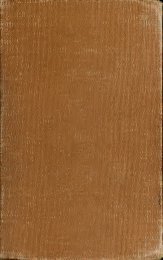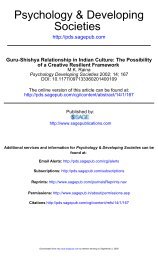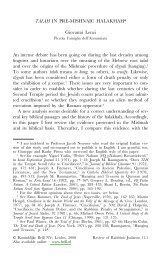Religion, Theology, and Philosophy on the Way to Being and Time ...
Religion, Theology, and Philosophy on the Way to Being and Time ...
Religion, Theology, and Philosophy on the Way to Being and Time ...
Create successful ePaper yourself
Turn your PDF publications into a flip-book with our unique Google optimized e-Paper software.
I. M. Fehér / Research in Phenomenology 39 (2009) 99–131 113<br />
speak, “unprejudiced”) access <strong>to</strong> life that <strong>the</strong> hermeneutic problematic emerges<br />
in Heidegger’s post war lecture courses. As early as in <strong>the</strong> immediate postwar<br />
years, Heidegger off ers, as alternative <strong>to</strong> rati<strong>on</strong>al c<strong>on</strong>cepts <str<strong>on</strong>g>and</str<strong>on</strong>g> <strong>the</strong>oretical knowing,<br />
what he calls “hermeneutical c<strong>on</strong>cepts,” 33 or—over against pure or <strong>the</strong>oretical<br />
intuiti<strong>on</strong>—“hermeneutical intuiti<strong>on</strong>.” 34 “Hermeneutics,” “hermeneutical,”<br />
emerge as rival c<strong>on</strong>cepts <strong>to</strong> “<strong>the</strong>ory,” “<strong>the</strong>oretical,” unders<strong>to</strong>od in terms of<br />
“<strong>the</strong>oretically neutral.” 35 Th e descripti<strong>on</strong> of life, or “facticity,” becomes hermeneutical,<br />
obtains an overall hermeneutic character, precisely in virtue of <strong>the</strong><br />
realizati<strong>on</strong> that interpretati<strong>on</strong> cannot be regarded as something added, as a<br />
kind of extensi<strong>on</strong> or annex, as it were, <strong>to</strong> some <strong>the</strong>oretically neutral (<str<strong>on</strong>g>and</str<strong>on</strong>g>, as<br />
such, allegedly “objective”) descripti<strong>on</strong> of a state of aff airs: ra<strong>the</strong>r, preliminary<br />
“interpretedness” is inherent in all kinds of descripti<strong>on</strong>, in all kinds of seeing,<br />
saying, <str<strong>on</strong>g>and</str<strong>on</strong>g> experiencing. 36 If <strong>the</strong>re is no “pure” <strong>the</strong>ory (for “<strong>the</strong>ory” is a derivative<br />
mode of being or comportment of <strong>on</strong>e particular being called human),<br />
<strong>the</strong>re is no pure descripti<strong>on</strong> ei<strong>the</strong>r. What this insight implies for an adequate<br />
descripti<strong>on</strong> of life or facticity is that <strong>the</strong>oretical c<strong>on</strong>cepts, as well as <strong>the</strong> language<br />
that <strong>the</strong>ory speaks, should be ab<strong>on</strong>d<strong>on</strong>ed in favor of a language growing<br />
out of everyday life <str<strong>on</strong>g>and</str<strong>on</strong>g> able <strong>to</strong> let things be seen in <strong>the</strong>ir interpretedness, that<br />
is, exactly <strong>the</strong> way we encounter <str<strong>on</strong>g>and</str<strong>on</strong>g> have <strong>to</strong> do with <strong>the</strong>m (a hammer, for<br />
example, is primarily encountered as a <strong>to</strong>ol for hitting nails in<strong>to</strong> <strong>the</strong> wall ra<strong>the</strong>r<br />
than as a neutral thing out <strong>the</strong>re having <strong>the</strong> property of weight). Th eoretically<br />
(<str<strong>on</strong>g>and</str<strong>on</strong>g> ahis<strong>to</strong>rically) neutral knowledge is opposed <strong>to</strong>, <str<strong>on</strong>g>and</str<strong>on</strong>g> gives way <strong>to</strong>, existentially<br />
(<str<strong>on</strong>g>and</str<strong>on</strong>g> his<strong>to</strong>rically) involved underst<str<strong>on</strong>g>and</str<strong>on</strong>g>ing (or pre-underst<str<strong>on</strong>g>and</str<strong>on</strong>g>ing) <str<strong>on</strong>g>and</str<strong>on</strong>g><br />
interpreting—whereby knowledge becomes at best a subdivisi<strong>on</strong> of underst<str<strong>on</strong>g>and</str<strong>on</strong>g>ing.<br />
37 All <strong>the</strong>se eff orts are in <strong>the</strong> service of seizing up<strong>on</strong> “life.” Th e main character<br />
of <strong>the</strong> latter is claimed <strong>to</strong> be c<strong>on</strong>cern (Sorge) ra<strong>the</strong>r than knowledge. 38<br />
Th e science that is destined <strong>to</strong> provide access <strong>to</strong> life in its originality is,<br />
as should be clear from what has been rec<strong>on</strong>structed, intrinsically interpretive,<br />
i.e., hermeneutical—an insight that explicitly crops up in a note of <strong>the</strong><br />
1919/20 lecture course saying: “<strong>the</strong> science of <strong>the</strong> origins is ultimately <strong>the</strong><br />
33) GA 9: 32.<br />
34) GA 56/57: 117.<br />
35) “Kategorie ist interpretierend und ist nur interpretierend, und zwar das faktische Leben, angeeignet<br />
in existenzieller Bekümmerung” (GA 61: 86f.).<br />
36) See explicitly, for example, GA 17: 294 (“Wir sehen die Welt immer in einem als”); fur<strong>the</strong>r<br />
PIA 241, 264. Later GA 20: 75, 190, 416; SZ 169, 383.<br />
37) See, for example, GA 64: 32: “Das primäre Erkennen . . . ist Auslegung.” Ibid., 36: “Auslegen<br />
ist das primäre Erkennen.” See <strong>the</strong>n SZ 147.<br />
38) See GA 61: 89ff .; PIA 240.



